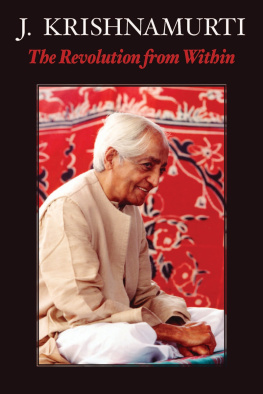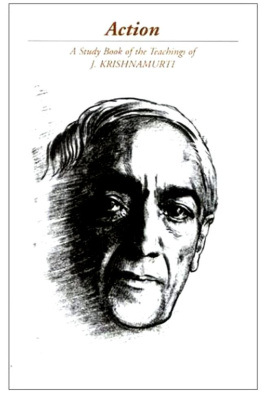Krishnamurti - Tradition and Revolution
Here you can read online Krishnamurti - Tradition and Revolution full text of the book (entire story) in english for free. Download pdf and epub, get meaning, cover and reviews about this ebook. publisher: Krishnamurti Foundation India, genre: Religion. Description of the work, (preface) as well as reviews are available. Best literature library LitArk.com created for fans of good reading and offers a wide selection of genres:
Romance novel
Science fiction
Adventure
Detective
Science
History
Home and family
Prose
Art
Politics
Computer
Non-fiction
Religion
Business
Children
Humor
Choose a favorite category and find really read worthwhile books. Enjoy immersion in the world of imagination, feel the emotions of the characters or learn something new for yourself, make an fascinating discovery.

- Book:Tradition and Revolution
- Author:
- Publisher:Krishnamurti Foundation India
- Genre:
- Rating:5 / 5
- Favourites:Add to favourites
- Your mark:
- 100
- 1
- 2
- 3
- 4
- 5
Tradition and Revolution: summary, description and annotation
We offer to read an annotation, description, summary or preface (depends on what the author of the book "Tradition and Revolution" wrote himself). If you haven't found the necessary information about the book — write in the comments, we will try to find it.
Tradition and Revolution — read online for free the complete book (whole text) full work
Below is the text of the book, divided by pages. System saving the place of the last page read, allows you to conveniently read the book "Tradition and Revolution" online for free, without having to search again every time where you left off. Put a bookmark, and you can go to the page where you finished reading at any time.
Font size:
Interval:
Bookmark:
Tradition and Revolution
Copyright 1972 Krishnamurti Foundation Trust Ltd.
TRADITION
AND
REVOLUTION
Dialogues with J. Krishnamurti
Edited by
Pupul Jayakar
Sunanda Patwardhan
CONTENTS
DIALOGUES IN NEW DELHI
DIALOGUES IN MADRAS
DIALOGUES IN BOMBAY
PREFACE
These dialogues, the majority of which are on ancient Indian philosophical themes, were first published in 1972 and have subsequently been reprinted several times. In offering a second edition, we hope to introduce new readers to the characteristic style of spiritual inquiry that Krishnamurti was able to nourish. The participants in these dialogues were not professional philosophers but people who were trying to rediscover the Indian philosophical past and, in some important sense which cannot be identified with scholarship, renew that past. In their attitude to the past, they were more like poets rediscovering a familiar language rather than like literary scholars anxious to get at the historical truth. The preface to the first edition of the book provides the clue to what the participants were seeking.
PREFACE TO THE FIRST EDITION
Since 1947 J. Krishnamurti, while in India, has been regularly meeting and holding dialogues with a group of people drawn from a variety of cultural backgrounds and disciplinesintellectuals, artists, sannysis. During these years, the methodology of investigation has richened and taken shape. What is revealed in these dialogues, as if through a microscope, is the extraordinary fluid, vast and subtle mind of Krishnamurti and the operational process of perception. These dialogues are not, however, questions and answers. They are an investigation into the structure and nature of consciousness, an exploration of the mind, its movement, its frontiers and that which lies beyond. It is also an approach to the way of mutation.
There has been in these dialogues a coming together of several totally varied and conditioned minds. There has been a deep challenging of the mind of Krishnamurti, a relentless questioning that has opened up the depths of the human psyche. One is witness not only to the expanding and deepening of the limitless, but also to the impact on the limited mind. This very inquiry leaves the mind flexible, freeing it from the immediate past and from the grooves of centuries of conditioning.
In these dialogues, Krishnamurti starts his questioning from a totally tentative position, from a state of not-knowing, and, therefore, in a sense, he starts at the same level as the participants. During the discussion, various analytical inquiries are made which are tentative and exploratory. There is a questioning without seeking immediate solutions: a step by step observation of the processes of thought and its unfoldmenta movement of penetration and withdrawal, every movement plunging attention deeper and deeper into the recesses of the mind. A delicate wordless communication takes place; an exposure of the movement of negation as it meets the positive movement of thought. There is the seeing of fact, of what is, and the mutation of what is. This is again perceived from various directions to examine its validity.
The nature of duality and non-duality is revealed in simple language. In that state of questioning, a state when the questioner, the experiencer, has ceased, in a flash, truth is revealed. It is a state of total non-thought. Krishnamurti says:
The mind, which is the vessel of movement, is completely quiet when that movement has no form, no me, no vision. In it there is no memory. Then the brain cells undergo a change. The brain cells are used to movement in time; they are the residue of time. And time is movement within the space it creates as it moves.
When there is no movement, there is a tremendous focus of energy. So mutation is the understanding of movement, and the ending of movement in the brain cells themselves. (Dialogue 6)
The revelation of the instant of mutation, of what is, provides a totally new dimension to the whole field of intellectual and religious inquiry.
There may be repetition in the dialogues, but they have not been eliminated, because to do so would have inhibited the understanding of the nature of consciousness and the method of inquiry.
We feel that these discussions will be of major assistance to those seeking a clue to the understanding of the self and of life.
P UPUL J AYAKAR
S UNANDA P ATWARDHAN
New Delhi
May 11, 1972
THE FLAME OF SORROW
Dialogue 1
K: What does sorrow mean in this country? How do the people in this country meet sorrow? Do they escape from sorrow through the explanation of karma? How does the mind in India operate when it meets sorrow? The Buddhist meets it in one way, the Christian in another way. How does the Hindu mind meet it? Does it resist sorrow, or escape from it? Or, does the mind rationalize it?
P: Are there really many ways of meeting sorrow? Sorrow is painthe pain of someone dying, the pain of separation. Is it possible to meet this pain in various ways?
K: There are various ways of escape, but there is only one way of meeting sorrow. The escapes with which we are all familiar are really the ways of avoiding the greatness of sorrow. You see, we use explanations to meet sorrow, but these explanations do not answer the question. The only way to meet sorrow is to be without any resistance, to be without any movement away from sorrowoutwardly or inwardlyand to remain totally with sorrow, without wanting to go beyond it.
P: What is the nature of sorrow?
K: There is personal sorrow, the sorrow that comes with the loss of someone you lovethe loneliness, the separation and the anxiety for the other. With death there is also the feeling that the other has ceased to be, and that there was so much that one wanted to do. All this is personal sorrow. Then there is that man, ill-clad, dirty, with his head down; he is ignorant, ignorant not merely of book-knowledge, but deeply, really ignorant. The feeling that one has for that man is not pity, nor is it an identification with that manit is not that one is placed in a better position than he is and so feels pity for him, but that there is within one the sense of the timeless weight of sorrow in man. This sorrow has nothing personal about it. It exists.
P: While you have been speaking, the movement of sorrow has been operating within me. There is no immediate cause for this sorrow, but it seems like a shadow, always with man. He lives, he loves, he forms attachments, and everything ends. Whatever be the truth of what you say, in us there is such an infinitude of sorrow. How is it to end? There appears to be no answer. The other day you said that in sorrow there is the whole movement of passion. What does it mean?
K: Is there a relationship between sorrow and passion? Is there such a thing as sorrow without a cause? We know the sorrow which is cause and effect. My son dies; in that is involved my identification with my son: my wanting him to be something which I am not, my seeking continuity through him. When he dies all that is denied, and I find myself completely emptied of all hope. In that there is self-pity, fear; in that there is pain which is the cause of sorrow. This is the lot of everyone. This is what we mean by sorrow.
Then there is also the sorrow of time, the sorrow of ignorance, the ignorance of ones own destructive conditioning; the sorrow of not knowing oneself; the sorrow of not knowing the beauty that lies at the depth of ones being and the going beyond.
Do we see that when we escape from sorrow through various forms of explanation, we are really frittering away an extraordinary happening?
Next pageFont size:
Interval:
Bookmark:
Similar books «Tradition and Revolution»
Look at similar books to Tradition and Revolution. We have selected literature similar in name and meaning in the hope of providing readers with more options to find new, interesting, not yet read works.
Discussion, reviews of the book Tradition and Revolution and just readers' own opinions. Leave your comments, write what you think about the work, its meaning or the main characters. Specify what exactly you liked and what you didn't like, and why you think so.









